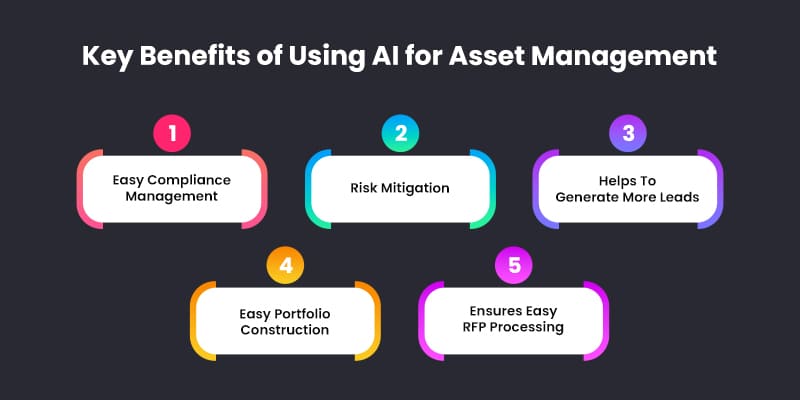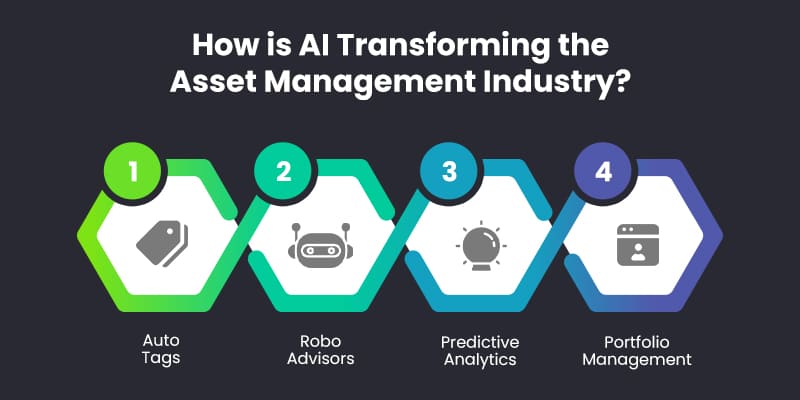
The significance of artificial intelligence in altering many industries has gained substantial and growing attention during the last few years. Given its focus on numbers and data, the asset management industry is especially well-suited for using AI.
Asset management is one of AI’s application areas that is expanding the fastest. Even many experts have identified AI for asset management and tracking as one of the top industrial use cases growing shortly.
But what’s with all the buzz surrounding AI-based asset management enterprise solutions? What are the advantages of AI for asset management?
In this blog, we’ll highlight and talk about the advantages of AI for asset management.
AI in Asset Management: What & Why?
Smart automation and intelligence are added to the system overall by AI asset management software. These solutions employ cutting-edge technologies that let businesses track exact information about their assets in real-time without involving human beings.
AI-based asset management software can provide organizations with a wide range of services based on the acquired data, including real-time notifications, alarms, predictive analytics, automated data insights, reporting, and much more. It might work well as part of an inventory management system.
The pressure of costs and margins in the industry is among the reasons asset managers are beginning to recognize the possibility of utilizing artificial intelligence in asset management to increase the efficiency of operational activities. Asset managers are rethinking their operating strategies of fee compression and the rising costs of compliance in response to increased regulation. Many people choose to eliminate outdated products, technologies, and vendors and outsource work to external service providers.
Why Must Businesses Consider AI Asset Management Software in 2022 & Beyond? Top Benefits!

The key benefits of using AI for asset management are:
Easy Compliance Management
From the perspective of compliance, one of the primary applications of AI in asset management is the decrease of erroneous warnings produced by conventional, rule-based compliance alert systems. AI algorithms can be taught to recognize regulatory information in public notices and provide a report using the data. Businesses can also utilize AI to track changes to investment standards from online official source papers. To streamline compliance alert systems, AI and machine learning also acquire, clean, and analyze various data aspects. By doing this, your company can avoid wasting time and money looking through extensive alert queues to locate information about an alert.
Also Read: Everything You Need to Know About Compliance Management Software Development
Risk Mitigation
When it comes to asset management, there are many factors that might lead to human mistakes, including inefficient procedures, antiquated equipment, and carelessness. Whatever the reason, human mistake costs regulated sectors billions of dollars annually. Additionally, asset managers must regularly collect, manage, and analyze data about transactions, customers, and operational activities due to the evolving local and international financial regulations. There is a chance that human error will arise as a result.
Applications of artificial intelligence (AI) can help reduce the effects of human mistakes when they are incorporated into a technology-driven approach. Blind spots, rational errors, and other problems that people might not always see can be found through AI-based solutions.
Helps To Generate More Leads
Asset managers had to manually gather and analyze data to locate potential customers before analytics and AI. Asset managers can use AI to find new leads, personalize pitches, and micro-segment prospects based on social media, news articles, and public data sources.
An AI system can match potential customers with relationship managers with similar interests, demographics, or clientele. Vast volumes of structured and unstructured client data may be processed by AI-based technologies like NLP, which can also optimize conversations based on prospects’ preferences.
Easy Portfolio Construction
Financial departments may find patterns and create AI models around them using data mining and business analytics. Managers can use AI to develop automated screening criteria for particular events, such as acquisitions, interest rates, trade conflicts, and natural disasters. Future occurrences can be predicted by examining how past events have affected a company’s portfolio.
Ensures Easy RFP Processing
Opportunities in the asset management industry are given as Requests for Proposals (RFP). A system can read your RFP and learn anything just by scanning it, as AI can leverage structured and unstructured data sets. This eliminates the laborious data submission procedure. Even the potential connection to a given RFP could be revealed by an AI application. The data mart expands as more RFPs are processed, which implies that your computer gets more and more competent as it is utilized more and more. Last but not least, the AI asset management software is able to suggest changes to ideas based on past performance and human input, which can aid your company in long-term success.
Apart from above-mentioned benefits of using AI in the asset management industry; some other benefits are:
- It reduces the role of human power and increases the proficiency of the apparatus.
- Improve the asset’s life by doing things like maintenance and replacements.
- Identifying the source of any problems the asset is having and strategically keeping track of costs.
- Determine which assets should be taken into consideration and which shouldn’t.
- Businesses can remain on top of fast-changing regulatory standards thanks to modern AI systems’ lightning-fast regulatory information processing capabilities.
- Keep an eye on the performance information to determine when an asset is likely to collapse.
- Finally, fix any potential issues and make wise financial choices.
Moving ahead, let’s discuss this,
How is AI transforming the asset management industry? Top use cases!

Top use cases of AI in asset management industry are:
Auto Tags
A tag is an element of information that is connected to an asset and frequently classifies the asset into a particular category and provides some kind of description for the asset. You can generate an unlimited number of tags in most AI asset management software, using them as supplementary metadata to improve searches and filters and make laborious file sorting easier. By automating a formerly manual and time-consuming process, an AI-based asset management software transfers this duty to the management system. In this case, the smart AI asset management software scans images, spots any things or persons, and then tags the photos with pertinent keywords.
Robo Advisors
Asset managers can forecast the optimal course of action for meeting customer needs with the help of AI-powered employee-facing Robo-advisory systems. Asset management companies have a significantly higher chance of boosting customer loyalty and keeping clients over the long run by providing more relevant and individualized communication.
Predictive Analytics
A more quantitative and data-driven approach to maintenance is taken with predictive maintenance. The technique is based on data collected in real-time while the asset is still in use. This is made feasible by the adoption of AI-driven solutions, which are crucial for developing a predictive maintenance strategy and, as a result, enabling effective asset management.
Portfolio Management
AI can be used in the asset management sector to automate asset allocations in financial portfolios and undertake sophisticated fundamental analysis, including the use of text analysis. AI approaches provide a more accurate appraisal of profits and covariances than make more traditional approaches. Then, these analyses might be applied to customary portfolio optimization methods. Furthermore, AI can be directly used to asset allocation decisions to create portfolios that more closely fulfill performance goals than portfolios created using conventional methods. AI also has applications in managing risk, including credit and market risk. Assessment, modeling, and forecasting of risk factors that have an impact on the investment portfolio include market risk assessments.
Read More: How to Develop AI-Based Portfolio Management Software?
How Can Matellio Help You With An AI-based Asset Management System?
Matellio can be your one-stop solution for integrating AI in your asset management company because to its ten years of experience in both software engineering and the development of artificial intelligence. Your unique AI-based asset management software can be designed, developed, and deployed by us without causing any disruption to your business operations.
Advanced AI development services from Matellio help companies automate their processes and swiftly tackle difficult business obstacles. Our AI center of excellence and team of specialists assist in decreasing downtime for currently used complicated procedures, expediting decision-making, and automating iterative chores. Our AI solutions help businesses modernize by giving them improved access to deep insights.
Conclusion
Lastly, artificial intelligence (AI) nowadays is essential for managing assets, presenting investment information, assessing risks, combating investment fraud, document verification, and many other areas of the asset management industry ecosystem.
Businesses that integrate AI into their operations frequently have a competitive advantage over people who don’t. The use of modeling techniques to assess and forecast trends of various types of investment in asset management has fundamentally altered the fundamentals of investing strategies.
You wouldn’t believe how easy and affordable it is to implement AI in asset management. It’s possible if you have the greatest solution and best AI development services to put it into action. Companies are utilizing AI in the asset management industry to reimagine their company operations, enhance customer experience, and cut costs due to its extensive uses and advantages.




